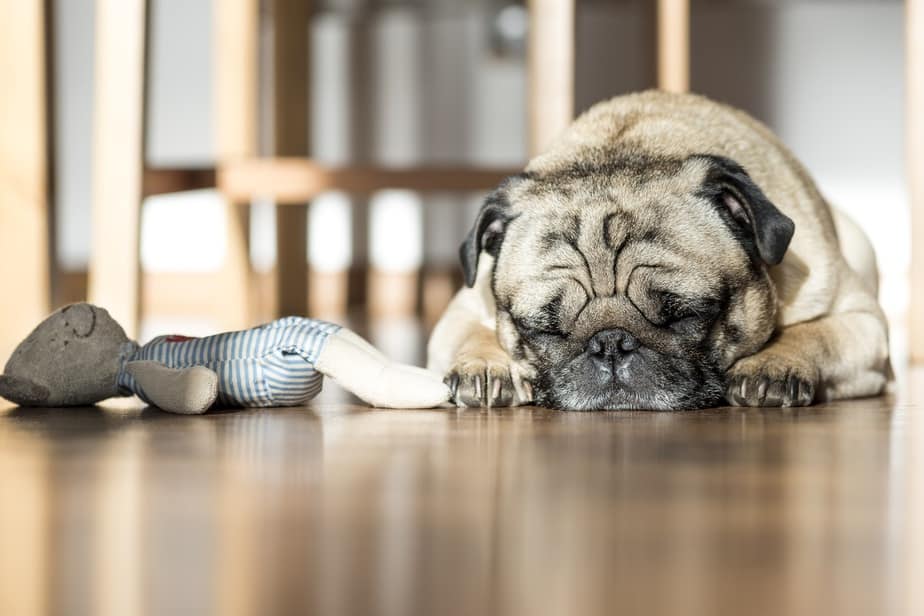There are many reasons why scuba diving can make you feel tired. The most obvious one is that it’s a physically demanding activity and your body needs some R&R after a dive in order to recover. Another possibility is that you had insufficient sleep or you didn’t fuel your body with the proper foods prior to diving. In an extreme case, you may feel tired after scuba diving because of decompression stress.
As you can see, there are many possible reasons why you might feel tired after scuba diving. Some reasons are quite normal, and some are cause for concern. In this article, we’ll go over the most common reasons why scuba diving makes you tired and help you discern if you are feeling a normal kind of tired, or an abnormal one that may require medical attention.
Why do I feel tired after scuba diving? Is it okay?
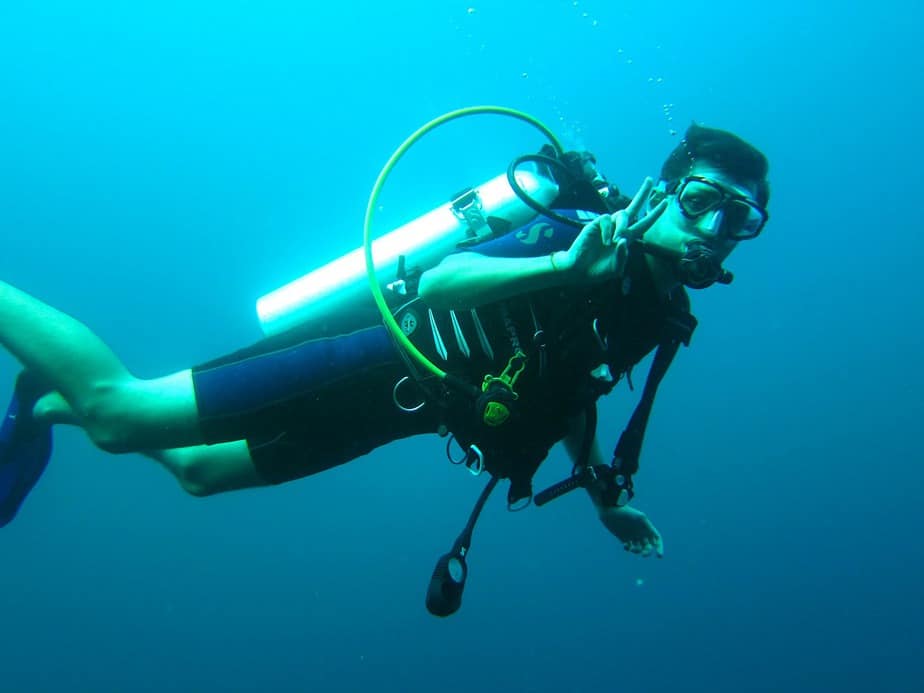
It depends on the degree of tiredness you are feeling. If it’s the same kind of feeling after you finish an intense workout, which can be described as lethargic and drained of energy, then that’s okay. Your muscles are spent and you need to have an energy drink or water and eat some food to refuel them.
However, if you are so tired that you are struggling to maintain consciousness and your muscles are not even that fatigued, plus rehydrating and eating food isn’t helping, then it can be a sign of decompression sickness. Let’s go over these factors in more detail.
Physical exertion
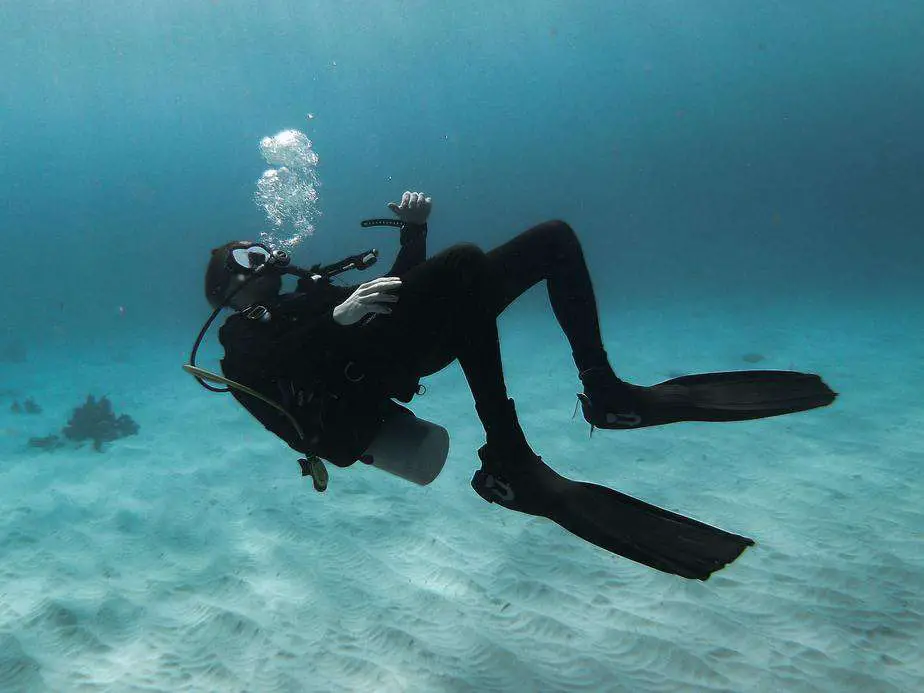
As we mentioned, scuba diving is a good form of exercise because you’re carrying around bulky equipment that creates significant water resistance while diving. Just moving around underwater is more exhausting than you think, so it’s no surprise that you can feel tired afterwards.
It is estimated that an average scuba dive can burn anywhere from 300-600 calories an hour, which is about the equivalent of doing light jogging for the same amount of time. In fact, that’s a great point of reference. How do you think you’d feel if you did the equivalent of an hour of jogging?
So long as your tiredness is in line with how you felt when you did some intense physical activity in the past, it’s likely not anything to be concerned with. The “fix” for this tiredness is to rehydrate, eat some food, and maybe take a nap and you’ll feel back to normal quickly.
Physiological factors
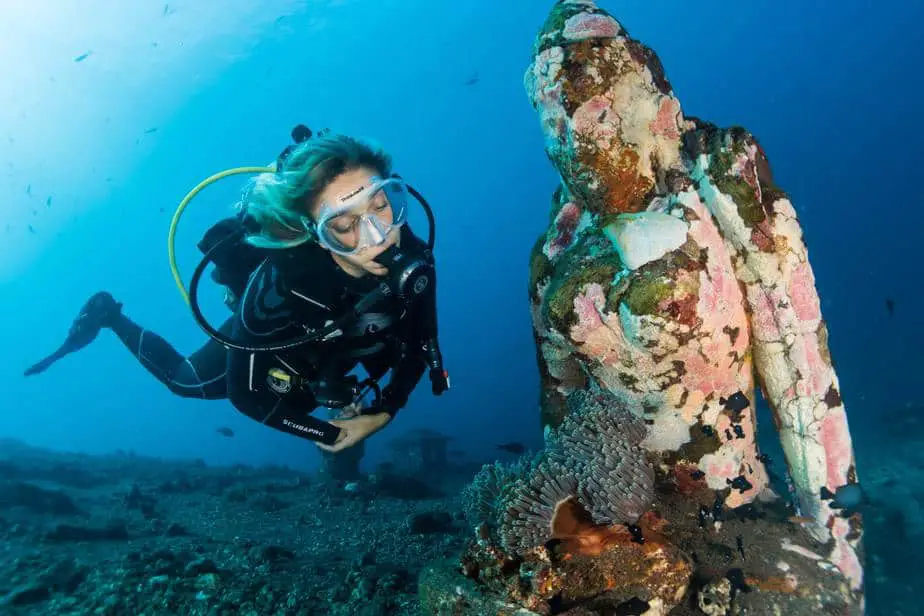
Scuba diving can make you feel tired just by being in the underwater environment even if you are very conservative with your energy. For one, the underwater pressure causes your heart to work harder.
Since water is cooler than your core body temperature (and it’s about 25x more effective at conducting heat compared to air), your body temperature is dropping over time. You’ll find that if you spend enough time in “warm” water, you’ll still end up shivering because the water is cooler than your core temperature.
In response, your heart will move blood away from your extremities and concentrate it around the organs, and this action forces your heart to work harder.
Additionally, your body will produce hormones which causes the kidney to increase urine production so that you can pee it out and reduce the pressure increase. This phenomenon is known as immersion diuresis and it’s the reason why it’s so common for scuba divers to pee in their wetsuit.
Immersion diuresis also causes you to lose a lot of fluid, dehydrating you. It’s also why you should avoid drinking caffeine and alcohol before diving because of their diuretic effects, and alcohol has even more negative effects on top of that.
Another effect the cold has on the body is it forces our metabolism to increase which causes stored fat to be used up at a faster rate compared to an equivalent land activity. This is great for weight loss, however it uses up energy quickly.
Since scuba diving affects our body in so many ways, causing it to work much harder than it typically does, it’s no wonder that we feel spent after surfacing. Under normal circumstances, rehydrating and eating food after a dive will remedy this problem.
Additional factors
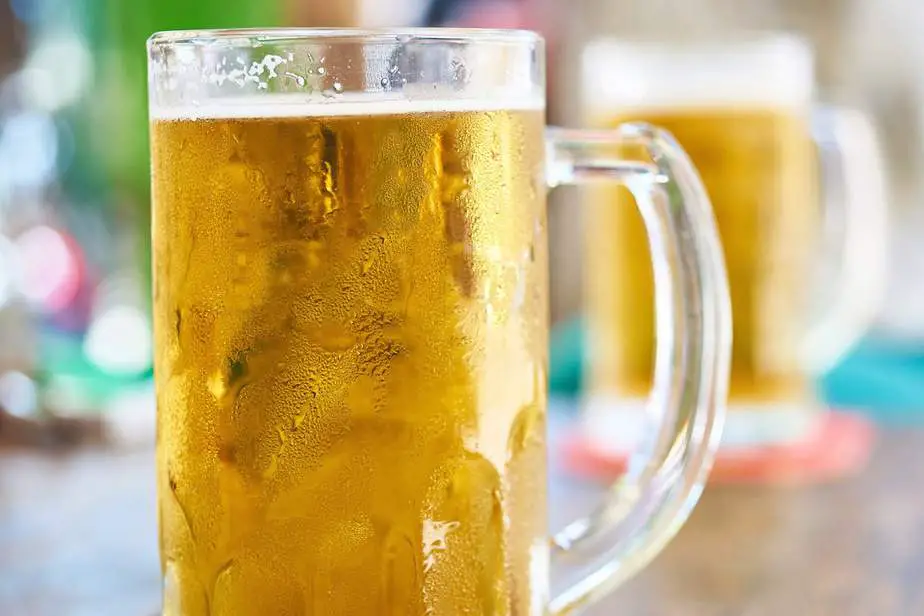
There are some additional factors that can cause you to be tired during and after a dive, such as:
- Insufficient sleep or poor sleep quality (e.g. jet lagged, too excited)
- Anxiety and stress.
- Being out of shape.
- Drinking alcohol or caffeine the night before.
- Seasickness.
- Not eating healthy foods or eating too large of a meal.
- Taking recreational drugs the night before or just before a dive.
- Some medical conditions.
- Decompression sickness (more on that in the next section)
So if you feel tired after diving and it’s NOT because of physical exertion, then these are some additional reasons why you might be affected. Determine which problem is the culprit and eliminate it accordingly.
Decompression sickness (the bends)
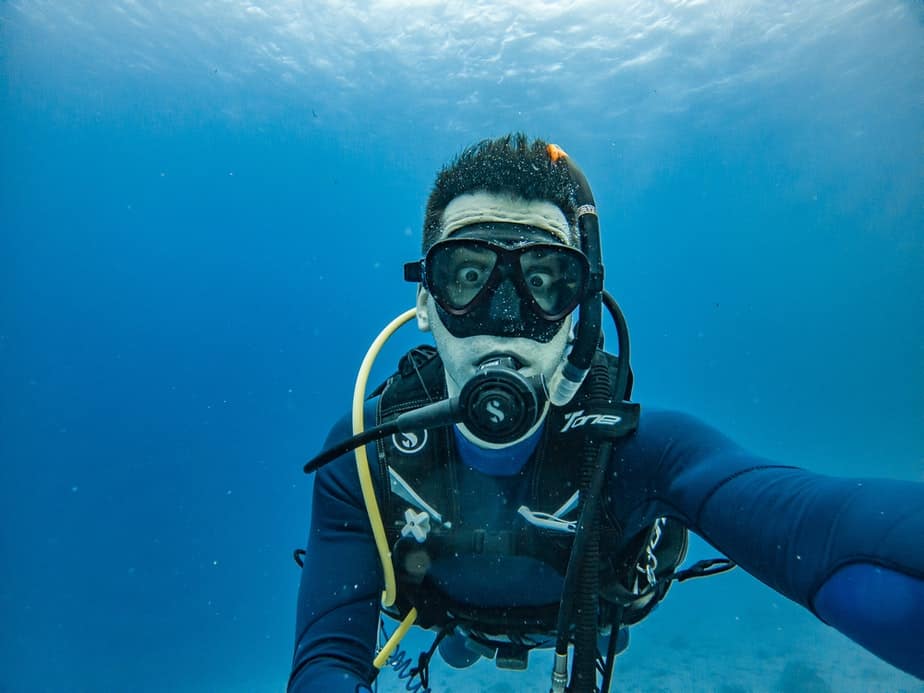
Decompression sickness, a.k.a. DCS or “The Bends” is what happens when the nitrogen gas that is absorbed into your system comes out of solution too quickly and forms bubbles in your joints, tissues, and bloodstream. Other than the risk of drowning, DCS is probably the biggest problem all divers will want to avoid. It is extremely dangerous and can be fatal.
The entire purpose of your dive computer is to help prevent DCS. It’s also the reason why mottos like “all dives are decompression dives” exist, and why you should do a safety stop for every dive. DCS occurs when you ascend too quickly. You need to give your body time to off-gas (i.e. let the nitrogen gas release at a slow pace) so you don’t get overwhelmed by the side effects the bubbles cause.
Common signs and symptoms of decompression sickness are:
- Aching joints stuck in a bent position.
- Numbness.
- Headache.
- Pain.
- Weakness.
- Dizziness.
- Difficulty walking.
- Unusual fatigue.
So when we consider that being abnormally fatigued is a possible symptom of decompression sickness, then you need to get medical attention ASAP. It should also be noted that diving when tired can make you susceptible to DCS.
To treat DCS, assuming there are no other injuries that are even more pressing, then the patient should be treated with 100% pure oxygen to breathe. In the meantime, you must contact a hyperbaric doctor and follow the instructions given.
The patient should be transported to a hyperbaric chamber where they can be placed under the same pressure as the depth they were diving at and then the pressure will be gradually decreased until they are back to ambient pressure. This basically simulates the slow ascent that they should have done but didn’t.
Even though there are treatments for DCS, that doesn’t necessarily mean one can make a full recovery. Depending on how severe the DCS was and how long it took to receive treatment, there may be permanent effects. As such, you should do everything in your power to avoid getting DCS in the first place.
Divers should be following the best practices during a scuba dive to stay safe. You should also prepare for a dive by getting a good night’s rest, avoiding alcohol, caffeine or any recreational drug, eating the right foods, and being in decent physical shape.
We also recommend setting your dive computer algorithm to a conservative setting, avoiding yo-yo (sawtooth) dive profiles, ascending below the maximum ascent rate, and doing a 3-minute safety stop before ending any dive.
Are some dives more exhausting than others?
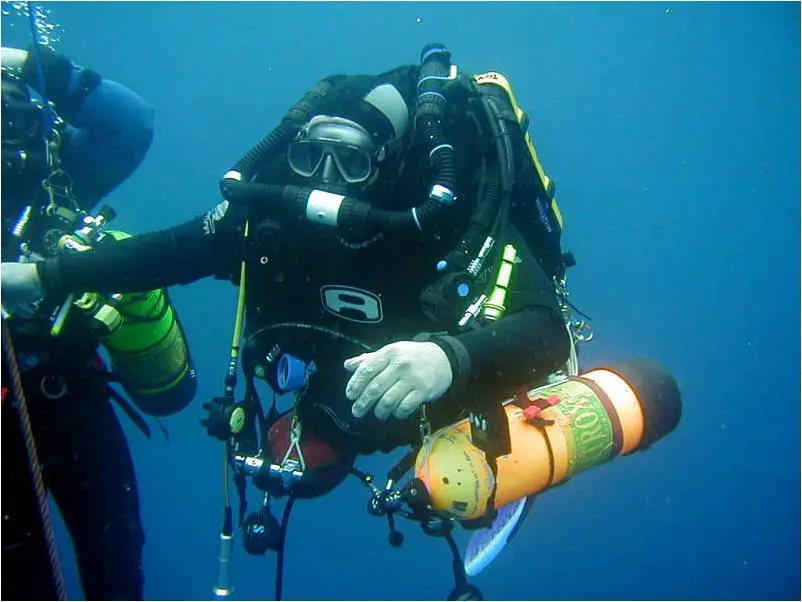
Absolutely. Depending on the type of diving you do, you can either have a leisurely dive or a hell of a dive. You’ll also have to consider the dive location and weather conditions. Some areas are known for their currents and the conditions on the surface may also make life hell for you.
For example, trying to swim against a strong current will cause you to exert yourself and you will subsequently feel tired afterwards. If possible, it’s better to go with the flow than against it. On the other hand, an underwater photographer staying stationary in one area for the perfect shot under calm conditions will hardly use up any energy.
As we mentioned already, cold water will cause your body to work harder to keep you warm. Thus, cold water diving is naturally more exhausting than warm water diving even if you dive the same way.
On top of that, your mental state can also factor into your exhaustion. For instance, diving when you’re stressed or anxious can make you feel more tired compared to someone else doing the same dive. Your heart rate will be elevated, and you will be in a constant state of hyper awareness despite there being no actual threat. This is causing your body to work harder and you will feel tired after diving.
Does my breathing gas affect how tired I feel?
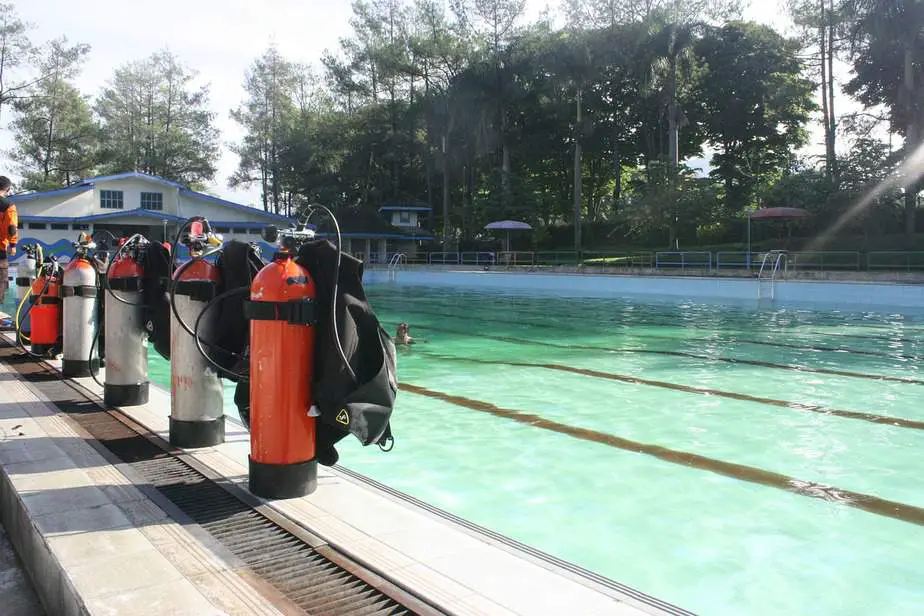
You may have heard another diver say that diving with enriched air nitrox helped them to feel less tired after a dive. For those who don’t know what nitrox is, it’s any gas mix that has a different percentage of oxygen in it compared to standard air, typically higher (hence “enriched”).
While there are many benefits that diving nitrox provides, there currently isn’t any conclusive scientific evidence that nitrox is the reason why divers are less tired after diving. The current explanation is that a placebo effect is taking place. Divers who dive nitrox hold a belief that they are gaining benefits that they aren’t, but thanks to the placebo effect, they actually do end up feeling better.
With that said, even if there shouldn’t be any impact on your tiredness when diving nitrox, it’s still a good thing to do so. One of the benefits of nitrox is that it extends your bottom time by reducing the decompression stress on your body. Thus, you are less likely to experience decompression sickness, and maybe the placebo effect will work on you too (by the way, placebos still work even if you know it’s a placebo)!
Is it okay to scuba dive when tired?

So far we have only discussed what might be causing you to be tired after diving, but what about if you feel tired before diving? Are you still able to dive?
Our recommendation is no, it’s not safe to dive and you shouldn’t even though it’s technically allowed. In the same way that it’s not recommended to drive while sleep deprived, you should not dive if you know you’re tired.
Scuba diving, like driving, is an activity that requires a reasonable level of situational awareness and stamina on top of that in order to be performed safely. When you consider that being sleep deprived is similar to being drunk, then you are gambling with your life.
Like being drunk, your decision making skills are impaired, as are your reaction times and dexterity. You may have a lapse in judgment and decide not to surface when you should, or not sense danger until it’s too late. If you need to perform precise movements, you will struggle to do that as well.
On top of that, diving when already fatigued makes you more susceptible to DCS. Perhaps you started your dive off feeling pretty good, then part way through you started to feel extremely tired. It’s unlikely that there’s anything you can do during the dive to remedy your fatigue.
This is as good a time as any to signal to your dive buddy that you want to end the dive and begin your ascent. Make your way back to the boat and don’t take the risk that things will be fine even though you’re tired. Maybe it ends up being a false alarm or maybe you got yourself out of a life-threatening situation. It’s up to you to make that call.
Can you fall asleep while diving?
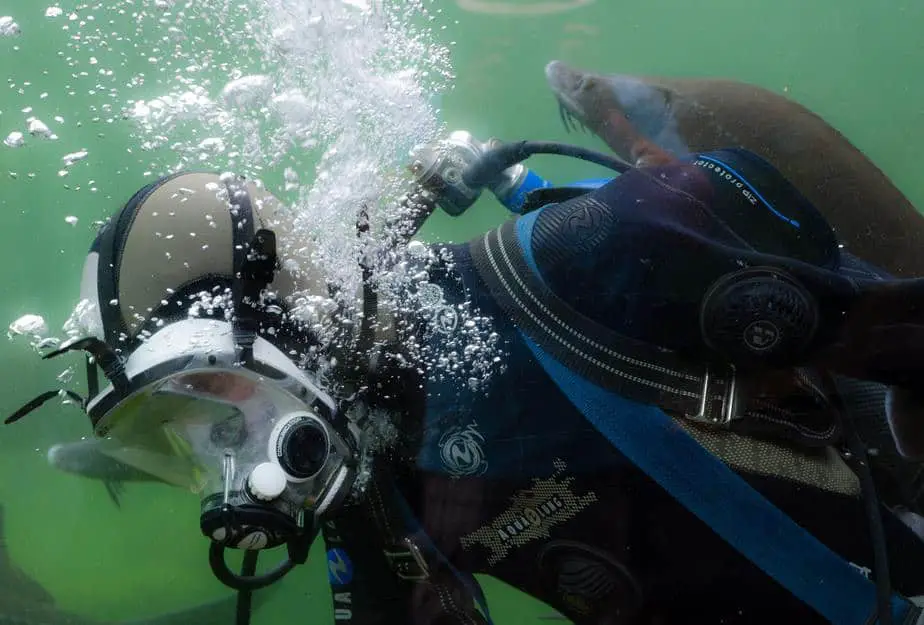
Considering people have fallen asleep while driving (we’re getting a lot of mileage out of the comparisons to driving), then sure, people can definitely fall asleep while diving. Some people find diving boring, but others find it to be a relaxing escape from the stresses of life, so depending on which extreme you’re on, maybe you’ll fall asleep if you’re tired on top of that.
Obviously falling asleep while diving is not a good idea. When you’re unconscious, you would lose control of your buoyancy which may cause you to sink to the depths if there isn’t a shallow bottom. Your mouth muscles may also go limp and the regulator slides out of your mouth, leaving you without an air source.
As you can see, any time you lose consciousness while underwater is an emergency. Since you’re unconscious, your life is out of your hands now, and you’d better hope your dive buddy is sticking close to you and will quickly notice you passed out. If you’re so tired that you might fall asleep mid-dive, then you’d best not dive.
How to prevent feeling tired when scuba diving

So the first and most obvious step is to get at least 7-9 hours of sleep the night before you dive. You should avoid caffeine and alcohol before sleeping because they will make it hard for you to get good quality sleep. Also go to bed at a reasonable time.
The day of the dive, treat yourself to a nutritious breakfast. In general, eat plenty of fruits, vegetables, grains, healthy fats, and lean protein. So foods like oats, cereals, bananas and the like are a great choice. You should also be drinking plenty of fluids to stay hydrated.
Depending on when you dive, it may be a good idea to have a light meal approximately 1.5 hours before the dive to serve as the fuel source for your muscles during the time.
If you’re nervous then you’re going to have to find a way to relax. Perhaps ask your fellow divers for advice and let your dive buddy or divemaster know you feel uncomfortable. That way, they can assist you and keep an eye on you during the dive. Some people will feel comforted knowing their dive group has their back.
Pay attention to the dive briefing so you know about dangers to avoid. You can also ask questions to help decrease the anxiety you might be feeling.
Make sure your exposure suit (wetsuit or drysuit) is appropriate for the water temperature you’ll be diving in. Most of the time, a wetsuit with 1-3 mm thickness is suitable for warm water diving, 4-5 mm is good for temperate waters, and a 6+ mm wetsuit or even a drysuit is best for cold water diving.
Try to be efficient with your movements during the dive. If you want to maneuver yourself, don’t use your arms, use your legs. Your fins will make your kicks more efficient. If you want to go up or down, adjust your positioning using your buoyancy compensator.
If you’re on a guided tour, follow the guide closely because they are probably taking the safe and scenic route.
When swimming against a current, try to do so close to a reef wall, rock, or by the bottom where the current is less powerful.
How to energize yourself after diving

Assuming you’re feeling a normal level of tiredness after diving, then the steps to energize yourself are pretty straightforward. First you must dry yourself and warm up quickly since being cold will tire you out as explained above.
Next, rehydrate by drinking electrolytes such as juice, a sports drink (don’t get it confused with an energy drink), or water with rehydration salts.
Eat some snacks that will refuel you for the next dive, but don’t eat too much or you’ll feel lethargic and tired.
If you have time, you can take a nap between dives. We recommend either napping for less than 25 minutes or napping for intervals of an hour and 30 minutes. This is because naps shorter than 25 minutes are still in the “light sleep” stage of a sleep cycle. You don’t want to wake up during the deep sleep stage of a cycle (stages 3-4, click the link to learn more about sleep stages).
Why intervals of an hour and 30 minutes? That’s because it coincides with the end of a sleep cycle and the start of another cycle in the “light sleep” stage. Each night, our body will go through 4-5 sleep cycles before waking up. If you wake up in the middle of a sleep cycle, you will feel groggy. It’s best to time it so that you wake up during the “light sleep” stage of a sleep cycle so you will feel less groggy.
Don’t drink coffee or alcohol before sleeping. Even if you manage to fall asleep quickly, the quality of your sleep will be lower. If you feel overly fatigued despite getting sufficient rest, then you may have to seek medical advice.
Feeling extreme fatigue after a dive may also be a sign of decompression sickness. The dive boat should have a tank of 100% oxygen on hand to treat divers that got bent until they can make it into a hyperbaric chamber.
Parting words
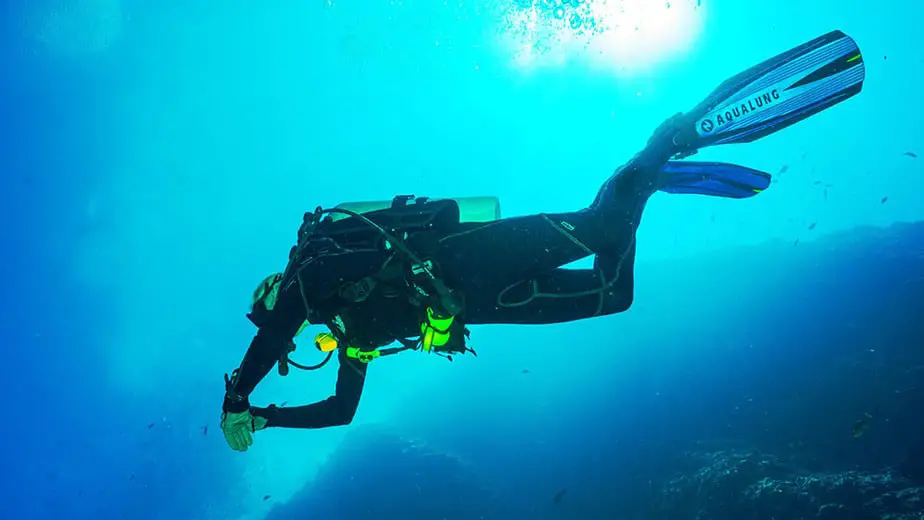
Typically, it’s quite normal to feel a little tired after scuba diving as long as you adhere to safe diving practices. We can chalk it up to being exhausted from exercise instead of anything more serious.
Your body has to work extra hard at keeping its core temperature high while diving, and that takes a toll on your body. You may have also exerted yourself too much and need some R&R before your next dive. Generally, as long as you stay warm, rehydrate, and eat nutritious foods, then you’ll make a full recovery quickly.
If the tiredness is excessive and unusual (i.e. the amount of physical exertion during the dive does not match with the level of exhaustion you’re feeling) then it may be a sign of decompression sickness. You will need to breathe 100% oxygen and get medical treatment.

